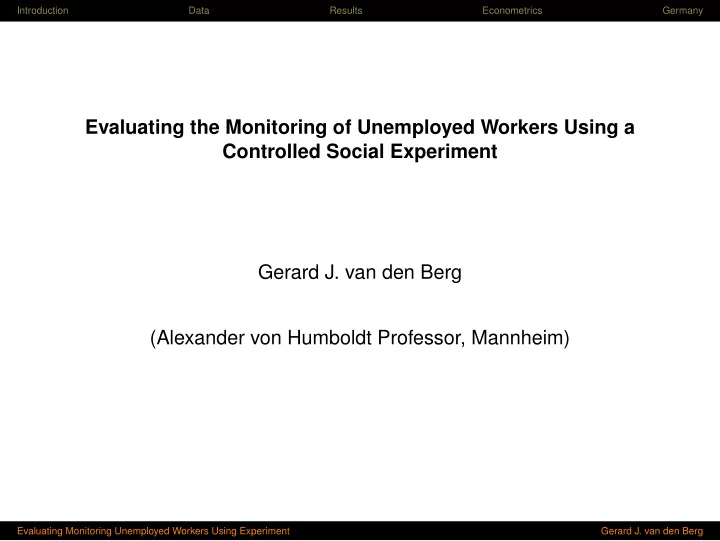

Introduction Data Results Econometrics Germany Evaluating the Monitoring of Unemployed Workers Using a Controlled Social Experiment Gerard J. van den Berg (Alexander von Humboldt Professor, Mannheim) Evaluating Monitoring Unemployed Workers Using Experiment Gerard J. van den Berg
Introduction Data Results Econometrics Germany AIM: study effects of C&M on individual outcomes: exit rate to work, outcomes after unemployment (wage, exit from job). Evaluating Monitoring Unemployed Workers Using Experiment Gerard J. van den Berg
Introduction Data Results Econometrics Germany AIM: study effects of C&M on individual outcomes: exit rate to work, outcomes after unemployment (wage, exit from job). From the description of C&M it is clear that it mostly involves monitoring of search effort (with the threat of punishments in case of violation). Confirmed by survey responses. Use the results to get insights into effects of monitoring unemployed workers in general. Evaluating Monitoring Unemployed Workers Using Experiment Gerard J. van den Berg
Introduction Data Results Econometrics Germany The results are reported in: Van den Berg, G.J. and B. van der Klaauw (2006), Counseling and monitoring of unemployed workers: theory and evidence from a controlled social experiment, International Economic Review 47, 895–936. Van den Berg, G.J. and B. van der Klaauw (2010), Structural empirical evaluation of job search monitoring, Working paper. Publications in Dutch, with Ger Homburg et al. Outline: 1 Data Empirical results 2 Experiments and econometrics 3 Experiments in Germany 4 Evaluating Monitoring Unemployed Workers Using Experiment Gerard J. van den Berg
Introduction Data Results Econometrics Germany Data: Collected right after the experiment: 1 Unemployment duration register 1998–1999. Interview survey (March 1999). Added later by us: 2 Unemployment duration register 1999–2004. Wage and job duration register 1998–2004. All these data are merged at the individual level. Evaluating Monitoring Unemployed Workers Using Experiment Gerard J. van den Berg
Introduction Data Results Econometrics Germany Empirical results: insignificant effects of monitoring on unemployment duration (–), accepted wage (–), and job duration (–). From the survey: Monitored unemployed individuals switch job search effort from informal to formal channels (e.g. from asking friends to writing application letters). Note: the latter are monitored but the former not. Also note: the individuals have good networks. Survey data are crucial to understand the findings from the register data. Evaluating Monitoring Unemployed Workers Using Experiment Gerard J. van den Berg
Introduction Data Results Econometrics Germany Extrapolations using economic theory and other (non-)experimental studies: With less favorable characteristics and conditions ⇒ less effort substitution ⇒ larger effects on exit rate to work and on wages. With less job-to-job mobility ⇒ more persistent long-run effects on wages and job durations. Theory and other empirical evidence are crucial to widen the relevance to alternative settings. Evaluating Monitoring Unemployed Workers Using Experiment Gerard J. van den Berg
Introduction Data Results Econometrics Germany Econometric expertise is crucial if we do not observe the outcomes for all treated and controls: Exit rate to work at duration t : this is only observed for those who are still unemployed at t . If there is a treatment effect then the treated with the best chances have already left before t . So the composition in terms of % treated/control is not random anymore among unemployed at t . . Wages: only observed for those who got a job before the end of the observation window (2004). Notice: social experiments with unemployed people: is often only allowed for non-prominent / unpopular policies with small expected effects. One reason for why the estimated effects are often insignificant. Evaluating Monitoring Unemployed Workers Using Experiment Gerard J. van den Berg
Introduction Data Results Econometrics Germany Social experiments in Germany: Largely non-existent (“ethical” concerns). Moreover: hard to get access to data registers (privacy concerns). However, recent change in views at National Employment Office. One of the experiments in which I am involved, together with IAB ( = research institute of National Employment Office): Information provision to older unemployed workers about their eligibility for a large wage subsidy. Evaluating Monitoring Unemployed Workers Using Experiment Gerard J. van den Berg
Introduction Data Results Econometrics Germany Connections between National Employment Office ↔ ESF Cooperation in implementation of ESF ALMPs in Germany. Evaluation of an ALMP of the ESF (non-experimental), by IAB. I will be involved with an International Conference on the use of social experiments for ALMP , at IAB in Nuremberg (Oct/Nov 2012). Evaluating Monitoring Unemployed Workers Using Experiment Gerard J. van den Berg
Recommend
More recommend